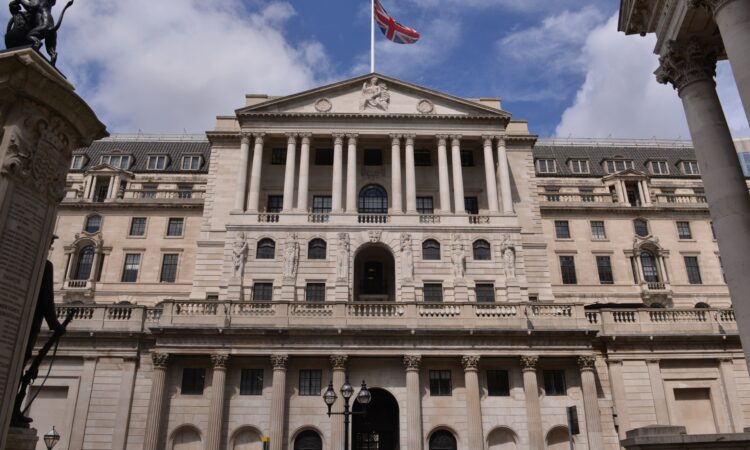
MILLIONS of homeowners face higher mortgage bills as the Bank of England is poised to hike interest again rates next week.
But pressure on the Bank of England (BoE) could be cooling as interest rates could peak earlier than expected.
Most economists think the Bank will raise the base rate by 0.25 percentage points on Thursday, August 3.
It would be the 14th increase in a row but would mark a smaller uplift than the surprise 0.5 percentage point hike to 5% in June.
Experts think the latest UK inflation data has taken some of the pressure off the central bank, because it showed a bigger-than-expected slowdown in price rises.
Consumer prices index (CPI) inflation was 7.9% in June, down from 8.7% in May and the lowest rate since March 2022, according to official figures from the Office for National Statistics (ONS).
It means that rates – which are a tool used by the Bank to bring inflation down to its 2% target – may not need to climb as high as feared.
In the UK, economists think a quarter-point increase would take interest rates to 5.25% in August, with at least one more rate hike to come in the months ahead.
The level could peak at about 5.75% this year, according to economists from the likes of ING Economics and Deutsche Bank.
Andrew Goodwin, chief UK economist for Oxford Economics, said: “Beyond this month (August), we’re sticking with our prediction of another increase in rates in September, at which point the present rate rise cycle should come to an end.”
Meanwhile, Investec Economics predicts the Bank will opt for a bigger 0.5 percentage point increase on Thursday, before pushing through a final quarter-point hike the following month.
It sparks hopes that the mounting pressure facing borrowers could be coming to a head.
Laith Khalaf, head of investment analysis at AJ Bell, said: “The market is now expecting interest rates to top out at 5.75% or 6% by the end of the year, so has already pared back its bets from the height of inflationary panic when rates north of 6% were envisaged.
Here are the four things to look out for this Thursday.
1. Mortgage rates rising
Exactly how much more your bill will rise will depend on the type of mortgage you have.
Those on a fixed-rate deal are safe for now – but face a huge jump in borrowing costs when they come to remortgaging.
Lloyds Banking Group, the UK’s biggest lender, said its customers who will be fixing to a mortgage deal over the rest of the year could face an average £360 increase in their monthly repayments.
But other mortgages, such as a tracker or standard variable rate (SVR) mortgage, could be impacted straight away.
There are 639,000 residential tracker mortgages outstanding.
Homeowners on variable-rate mortgages might not see their repayments go up straight away, but they will likely increase shortly after interest rates are hiked.
But the exact amount depends on your borrowing and your loan-to-value.
2. Credit card and loan rates could rise
The cost of borrowing through loans, credit cards and overdrafts could go up too, as banks are likely to pass on the increased rate.
Certain loans you already have like a personal loan or car financing will usually stay the same, as you’ve already agreed on the rate.
But rates for any future loan could be higher, and lenders could increase the rate on credit cards and overdrafts – although they must let you know beforehand.
You can cancel a credit card if you want and will have 60 days to pay off any outstanding balance.
The average interest rates on personal loans are already at their highest rate since October last year.
3. Savers could get better rates
Savers could get some further relief as banks continue to battle it out by offering market-leading interest rates.
A rate rise is generally good news for savers, especially after a long stretch of getting very low rates on their money.
Another rate rise could see banks pass on higher rates to savers – though they are usually much slower to act than with passing on higher rates for borrowing.
Anyone currently getting a low rate on easy access savings could find it’s worth looking around for a better rate after any rate rise and moving their money.
Right now, savers can get up to 4.55% in easy-access savings accounts and up to 6.1% in certain fixed bond accounts, according to MoneyFactsCompare.
4. Inflation will remain high for now
Rising inflation indicates that the cost of goods and services is rising, so your money won’t count for as much as it did before.
But to tackle inflation, the Bank of England opts to raise interest rates, which reduced spending power and demand subsequently bringing prices down.
And as part of that announcement, the BoE will also say what it thinks about the economy and make fresh predictions for inflation and GDP.
The UK’s rate of inflation dropped more than expected to 7.9% in June this year.
But despite the figures slowing, it still means the prices of everyday essentials are rising more than the BoE would like, which has a 2% target for inflation.






